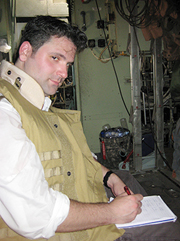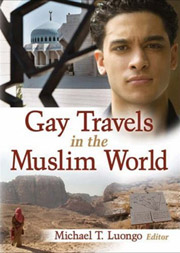Queer Culture Clash
By Brandon Wolf

Whenever gay author Michael Luongo smells smoke, he finds himself back in New York City and the date is September 11, 2001.
“I flew in from Dallas very early in the morning of 9/11 and saw the Twin Towers for the last time,” Luongo remembers. “A few hours later, I was awakened when my cell phone kept ringing.”
Luongo listened to voice mails from family members and friends and then turned on his TV. As he watched, a tower fell. Living only 12 miles from Ground Zero, he felt his building shake from the 2.3 Richter-scale earthquake that followed the collapse. He took a bus towards town and eventually met up with friends. “I smelled the smoke,” says Luongo. That memory persists even today.
Four days later, Luongo went into the pits as a volunteer. Relatives of first responders were allowed to enter, and his brother-in-law was a policeman. “It was like a war zone,” he recalls with emotion. “I was part of a bucket brigade, and it was our job to find dead bodies. It was life changing, smelling the smoke and digging for the dead in my own hometown. Dogs were sniffing for bodies, and whenever one was discovered, someone would yell for a priest.”
 Luongo says that, as a result of 9/11, he became interested in visiting Muslim countries. He did not want the tragic events of that day to be used as an excuse to bomb in the Middle East. “I was determined to learn what I could about Muslims,” he says. Besides compiling a book titled Gay Travels in the Muslim World, he flies to speaking engagements around the globe, hoping to offer new perspectives on the realities of Muslim lands. On a recent trip to Houston for a book reading sponsored by the Houston Public Library, he explained to OutSmart how to view Muslims in a different light.
Luongo says that, as a result of 9/11, he became interested in visiting Muslim countries. He did not want the tragic events of that day to be used as an excuse to bomb in the Middle East. “I was determined to learn what I could about Muslims,” he says. Besides compiling a book titled Gay Travels in the Muslim World, he flies to speaking engagements around the globe, hoping to offer new perspectives on the realities of Muslim lands. On a recent trip to Houston for a book reading sponsored by the Houston Public Library, he explained to OutSmart how to view Muslims in a different light.
Defining the Muslim World
“Is there such a thing as the Christian World?” Luongo responds when asked to define the Muslim World. “The idea of a Muslim World is an artificial term. In very broad terms, it might include North Africa, Sub-Saharan Africa, parts of Europe, the classic Middle East, Albania, Yugoslavia, and even the suburbs of Los Angeles.”
Luongo admits that some people still think that Muslims are “a bunch of terrorists” and that in general people think of the Muslim world as “the Middle East.” “But ordinary Middle Easterners don’t want atrocities,” he says. “They didn’t want 9/11. A small percentage of people have hijacked their reputation. Should all Americans be judged for the torturing of prisoners at Abu Ghraib Detention Center? You can’t take a minority of people and ascribe their behavior to an entire country.”
“The majority of Muslims do not support Osama bin Laden,” Luongo says. “They are just trying to live—to go about their daily lives—and do things like fall in love. Islam as expressed in individual countries is vastly different. Turkey is a secular country, but has an Islamic president. In Jordan some women are fully covered and others dress like Britney Spears. Egypt has belly dancers. Even within a country, Islam may be expressed differently depending on the city.”
As a travel writer and a public speaker, Luongo feels that many people are eager to learn about the daily lives of people in the Muslim world. He wanted to go beyond the media sound bites, and overcome fears.
Gay Rights in the Muslim World
“The desire for other men is biological,” says Luongo, “but the expression of that desire is cultural. Same-sex behavior is very tolerated in Muslim countries. The behavior is not an issue. The cultural flashpoint is the taking on of a gay identity and the asking for gay rights. And it’s actually the broader issue of human rights—it’s difficult for women, for religious minorities, and for gays.”
Luongo continues: “One has to understand that men and women are separated in general—the women socialize with women and the men socialize with men. It’s normal for Muslim men to hold hands. It’s a sign of friendship. In these countries, it is part of the culture, and so if all men hold hands, then it doesn’t signify being in love. The West has assigned sexual orientation to the behavior of holding hands, so men don’t hold hands publicly in America. But each culture looks at behavior in its own separate way.
“It’s impossible to take a Western definition of the word gay and use it in Middle-Eastern countries. For example, if a gay Muslim man has never seen a Bette Davis movie, how can he be expected to understand the humor in her quotes? At the same time, a straight Muslim man may act very flirtatious in a way that is innocent to him, but seems like a come-on by a gay man from the West.”
Luongo also points out that gay Middle-Eastern men who haven’t married don’t really have any opportunity to move in with a partner of their choice, because in these countries unmarried men must remain with their families. He also notes that some things are understood in Muslim countries, but not talked about. “Not all men need girlfriends—not all men need to get married. People just understand and they just talk around it. As a broad example, many of these countries don’t use street signs, and yet people just know where they are going.”
Firsthand Accounts of Muslim Gay Life
In 2007, Luongo published a compilation of 18 individual personal accounts written by different travelers, under the title Gay Travels in the Muslim World. The book is rich with anecdotes from locations such as Mauritania, Oman, Bangladesh, Afghanistan, Morocco, Iraq, Egypt, Turkey, and Israel. The reader meets a variety of characters—among them soldiers, tour guides, students, and masseuses. The more erotic accounts introduce us to Middle-Eastern rent-boys—on the way up, in their prime, and over the hill. At one point, Luongo himself takes us for a taxi ride through Kabul, Afghanistan, to a private gay party. The ride is dark, exciting, and tinged with paranoia.
We are taken into the private worlds of gay men in cities such as Cairo, Marrakech, Dirhana, Tangier, Jeddah, Al Ain, Muttrah, and Mamadou. We rub shoulders with men named Yussef, Mohammed, Khaled, Gidon, Bustan, Ziyad, Mustapha, Krim, Munir, and Syed. We witness a bittersweet interracial love story and cringe at the tale of a romance gone wrong that ends in murder. We hear Muslim prayers from the mosque minarets and barroom memories of Mick Jagger’s visits to the Middle East.
One particularly touching story is that of an American soldier named Lance Corporal Jeff Key and a young gay Iraqi named Ahkmed. During a brief stay in a town named Badrah, Key is standing guard when he notices a handsome young local watching him. The two continue to catch each other’s eyes, and finally they move close enough to each other to speak briefly. They each exchange compliments about the other’s attractiveness. Then Ahkmed reaches into his pocket and takes out a ChapStick. He rubs it on his lips, checks to see that no one is looking and kisses the tip of it. He hands the lip balm to the soldier who doesn’t quite understand. Ahkmed kisses the air and indicates that he wants Key to keep it. Finally Key takes it, rubs it on his lips and smiles. As he drives off to the next town, he realizes that Ahkmed had crossed a huge cultural divide and sent him on his way with a warm kiss to remember him by.
How to Do More for Muslim Gays
Luongo says that many gay groups operate within Muslim countries, but always in a low-key fashion. “It’s important to realize that these groups have to work within their local cultures to achieve success. Most of their work has to be done underground. The work is done by volunteers who understand the dynamics of the local cultures. If activists were caught, there is the possibility that they could be executed.”

He cautions gays who visit the Middle East: “Tourists and media reporters, who travel to Muslim countries and meet gay people and photograph them, should be very careful not to put names or pictures on the Internet or in the international media identifying them as gay. This could lead to the deaths of these people.”
To try to understand gay Muslims better, Luongo laughs and says, “Don’t watch Fox News!” Then he adds, “Nothing is more powerful than reading.” If you’re looking for a good jumping-off point to read about gay Muslims, Luongo’s book Gay Travels in the Muslim World is an excellent place to start.
Brandon Wolf also wrote the LeftOut column in this issue of OutSmart magazine.
See also Coming Home: Thoughts from a Jewish American gay man in Israel (Part One)
by David Goldberg











FB Comments